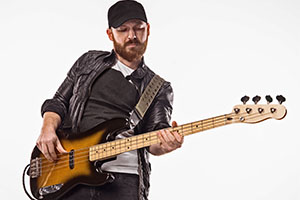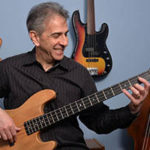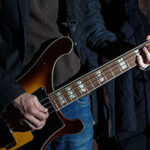“The notes will come, but if you’ve got the feel, you’re halfway there”
By Jon Liebman
January 6, 2023
Now that you’ve decided to learn bass, you might be wondering just how technically advanced you need to be in order to lay down a good bass groove.
The short answer is: Not as much as you think. Naturally, you’ve got to have some basic proficiency on the instrument, but knowing how to apply that proficiency is more important, and that’s where your focus should be.
What if I told you you’ve already got what it takes to play the bass – even if you’ve never played it before?
Maybe you’re a late starter. Maybe you’re dealing with arthritis, tendonitis, or joint pain. You might even be recovering from surgery or other things that are increasingly common to those of us over 50.
Good news for you
You don’t need to be 24 and built like a Greek god to learn bass. Playing bass doesn’t require brute strength. In fact, even a super simple bass line, which doesn’t require any undue stress on your muscles and bones, can make an enormous impact on the music, not to mention providing enormous joy and satisfaction.
You know what kind of music you love, don’t you? Well, you don’t have to be James Jamerson to play Motown tunes. You don’t have to be Geddy Lee to play a Rush song. You just need the right feel.
And you’ve already got that!
“Find the feel”
A couple weeks ago, I was talking with Jeff Pilson (Dokken, Foreigner…) for this week’s FBPO interview. I told Jeff about the staggering number of “old rockers” flocking to my site to learn bass and I asked him what advice he had for those people.
“Find the feel,” he said. “You don’t have to be this ‘chops guy’ to enjoy it. You can love it just for the groove.”
I want you to read those two sentences again. It’s important you understand that whether or not you have superhuman chops, playing bass is about grooving and making the music feel good.
“And that’s me,” says Jeff. “I love to just groove.”
Simple is best
Now you’re probably thinking, “That sounds great. But isn’t that oversimplifying things?”
Well, yes and no. It’s simplifying things, but it’s not oversimplifying them. And that’s the point. It’s amazing what you can accomplish when you keep things simple. You just need to get started.
“My suggestion,” says Jeff, “is pick up your favorite records, your favorite stuff – is it Motown? Is it R&B? Is it blues? – whatever it is, and just play along. Even if you don’t have every note exactly right, find the feel.”
Find the feel. What a great way of putting it. That’s why we play bass – because it feels good!
“There’s always a pulse to music,” says Jeff. “Bass, and the pulse of the music, are intrinsically linked, so find the pulse.”
Here’s the best way to start
Here are three things you can do right now to put Jeff’s advice into action:
1. Find the key of the song you want to play;
2. Figure out the first note of each bar, which is almost always the root of the chord;
3. See if you can add just one or two notes between those roots in order to capture the “essence” of the groove.
“Just play along,” says Jeff, “even if you don’t have all the notes right. Feeling it is so much more important than anything else.”
Watch your grooving improve
As you build your bass technique in an organized manner, you’ll gradually be able to add more of what you feel into your grooves. Always remember that chops building is a means to an end, and not the end itself. What’s really important is the song, so be sure to get into the feel of the song.
“Get into the zone,” Jeff says. “Feel hypnotically charged by the music. Then work on the notes.”
Building bass technique and feeling the music go hand in hand. Once you’ve got your priorities in line, you can apply what you practiced to the music.
“The notes will come,” says Jeff, “but if you’ve got the feel, you’re halfway there.”
What about you?
Have you ever felt like you’re doing all the “right” things when it comes to learning bass technique but you’re not sure why you’re doing those things or how you’re supposed to apply “all those notes” into making music? Leave a comment below and share your story.
For more thoughts on the subject, you can watch my complete interview with Jeff here.






“ … chops building is a means to an end, and not the end itself”
I think this is where the whole thing goes sideways. What I don’t understand is why blazing solo chops on six string basses is revered at all when it’s all been done before …. on guitar. We should be revering Duck Dunn, Carol Kaye, Lee Sklar etc. Those guys are the real heroes.
So true, Grayden. Thanks!
Better technique gives me more ways to express feelings.
Great to hear that, Ted! Thanks for the comment.